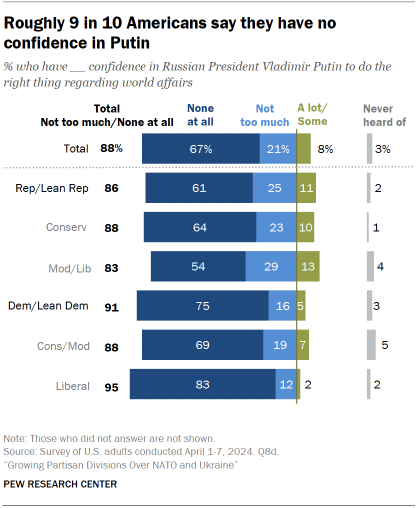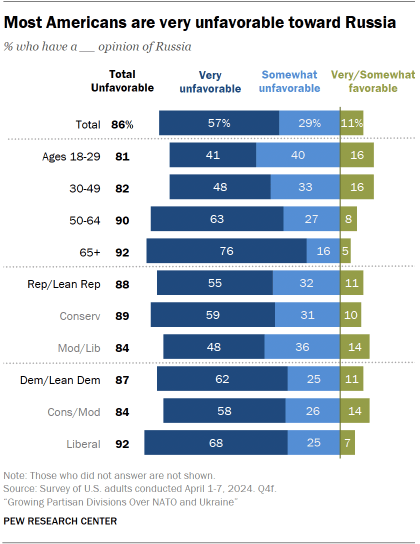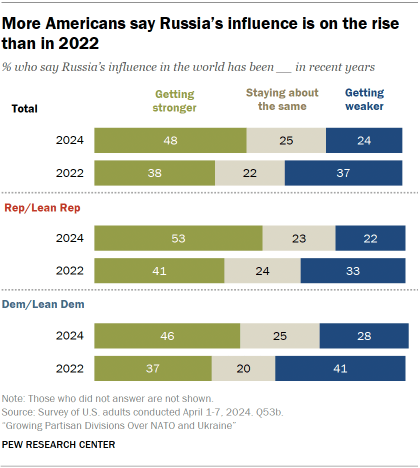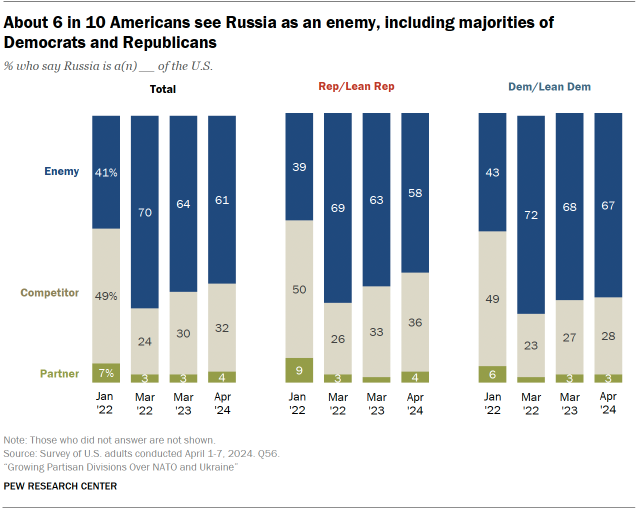Here are key takeaways of how Americans see Russia and its president:
- Negative ratings for Russian President Vladimir Putin remain very high: 67% of Americans have no confidence at all in the Russian leader to do the right thing in world affairs.
- Americans continue to see Russia in a negative light, but an increasing share see Russia’s influence in the world getting stronger.
- Roughly six-in-ten believe Russia is an enemy of the U.S., rather than a partner or competitor, but the share who say Russia is an enemy has declined over the past two years.
Confidence in Putin

Americans overwhelmingly rate Putin negatively: 88% say they do not have confidence in the Russian president to do the right thing regarding world affairs, with two-thirds saying they have no confidence in him at all. A similar share lacked confidence in him in 2023 (90%).
Partisan gaps are relatively small on this question, with Democrats and Democratic-leaning independents only slightly more negative toward Putin than Republicans and Republican leaners. While liberal Democrats are the most likely to say they lack confidence in Putin (95%), about eight-in-ten or more hold this view among conservative and moderate Democrats, moderate and liberal Republicans, and conservative Republicans.
Attitudes toward Russia

Americans continue to hold strong negative opinions of Russia more than two years after Russia’s military invasion of Ukraine. More than eight-in-ten say they have an unfavorable view of the country, including 57% who say they have a very unfavorable view. Only around one-in-ten Americans rate Russia favorably.
While more than eight-in-ten express an unfavorable opinion across all age groups, older adults are particularly likely to hold this view.
Republicans and Democrats are about equally likely to say they view Russia unfavorably (88% vs. 87%), although Democrats are more likely to have very unfavorable opinions of Russia.
Russia’s influence in the world

About half of Americans (48%) see Russia’s influence in the world increasing – up 10 percentage points since March 2022, just after Russia’s invasion of Ukraine. The share who say Russia’s influence is getting weaker (24%) declined 13 points over the same period.
People ages 65 and older are more likely than those ages 18 to 29 to see Russia’s power on the rise (57% vs. 46%).
Republicans are more likely than Democrats to say Russia’s influence is getting stronger. Among Republicans, a majority of conservatives say Russia’s influence has been getting stronger, more than any other ideological group. Republicans were also more likely than Democrats to believe Russia’s influence was increasing in 2022.
Russia as an enemy, competitor or partner of the U.S.
Roughly six-in-ten Americans (61%) label Russia an enemy of the U.S., while 32% call it a competitor and just 4% see it as a partner. The share of Americans who consider Russia an enemy increased dramatically in the immediate aftermath of the Russian invasion of Ukraine, but has dropped 9 points between March 2022 and today.

Majorities of Republicans and Democrats see Russia as an enemy, though Democrats are more likely to say this than Republicans (67% vs. 58%). Liberal Democrats are the most likely to see Russia in this way, with nearly three-quarters labeling it an enemy. In turn, moderate and liberal Republicans are the least likely to hold this view: Around half say Russia is an enemy of the U.S. Overall, the share of Republicans who call Russia an enemy has decreased slightly since last year (by 5 points) but is down 11 points since March 2022.
Older Americans are much more likely than younger Americans to consider Russia an enemy: 79% of adults ages 65 and older say this, compared with 48%% of adults under 30. Half of Americans also say limiting the power and influence of Russia should be a top priority in U.S. long range foreign policy.
Related: Americans Remain Critical of China




